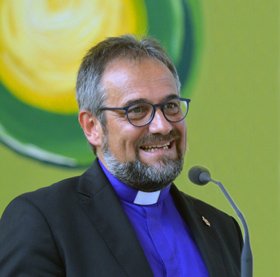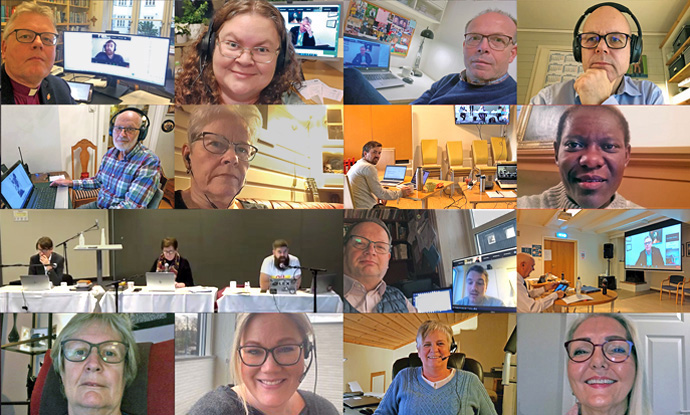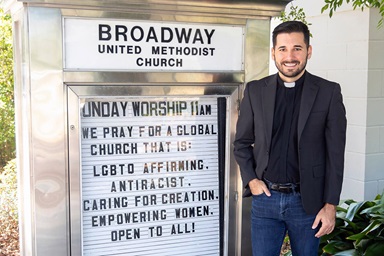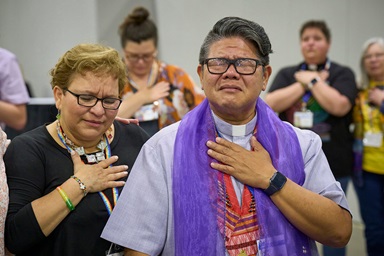A Igreja Metodista Unida na Noruega e na Alemanha tomou decisões sobre como se tornar mais inclusiva para as pessoas LGBTQ em suas congregações.
Durante uma reunião virtual no final de novembro, a Conferência da Noruega fez planos para emitir um pedido público de desculpas às pessoas LGBTQ como parte de um processo contínuo que leva à inclusão total. A Igreja Metodista Unida seria a primeira igreja na Noruega a emitir tal pedido de desculpas.
O comitê executivo da Igreja Metodista Unida na Alemanha concordou em ser mais aberto em questões relacionadas à sexualidade humana, ao mesmo tempo em que criou um “Pacto Comunitário” destinado a acomodar esses membros e congregações de uma perspectiva mais tradicional e conservadora.
O comitê executivo, reunido de 20 a 21 de novembro, aceitou por uma “maioria esmagadora” uma proposta da mesa redonda de 21 pessoas presidida pelo Bispo de Área da Alemanha, Harald Rűckert. A mesa redonda, apesar das opiniões divergentes sobre a homossexualidade, apresentou a proposta ao comitê por unanimidade. Os delegados da Conferência Central da Alemanha estavam lá para discutir a proposta e recomendaram que o comitê a aceitasse, mas não votou.

A decisão suspende passagens negativas e restritivas da versão alemã do Livro da Disciplina relacionadas à homossexualidade - incluindo a proibição de casamentos entre pessoas do mesmo sexo - enquanto garante que pastores e igrejas da ala conservadora da Igreja alemã "não sejam obrigados a agir contra sua própria consciência”, disse a igreja em um comunicado à imprensa .
As ações do comitê são provisórias até a próxima reunião da Adiada Conferência Central da Alemanha em novembro de 2021. O comitê executivo expressou sua esperança de que essas mudanças tornem possível permanecer juntos como uma igreja no espírito de "humildade convicta" e observou que o plano preserva a natureza conexional da igreja.
Na Conferência da Noruega, houve um longo debate sobre a formulação do pedido de desculpas planejado.
“Para mim, pessoalmente, não significa muito. Eu pertenço à Igreja Metodista Unida Moss, uma igreja aberta que sempre me acolheu como uma pessoa gay”, disse Lasse Gåsland Skage, um delegado leigo dessa igreja que iniciou uma rede para metodistas que se identificam como LGBTQ na Noruega.
“Mas para muitos antes de mim que não se sentiam bem-vindos, e para pessoas com filhos e netos que são gays, acredito que isso é muito importante. Acredito que muitos acham que a igreja está desfazendo uma injustiça de longa data”, disse ele.
Uma frase de Ole-Einar Andersen, que trouxe à discussão a proposta de desculpas, foi citada como um bom ponto de partida para o texto.
“Reconhecemos que, por meio de atitudes e ações condenatórias, infligimos grande dano, dor, tristeza e sofrimento a outros seres humanos, ao contrário do evangelho da graça incondicional de Deus e do amor por todos”, escreveu Andersen.
A formulação do texto ficará a cargo da diretoria executiva e do gabinete da conferência.
A emenda foi aprovada com 70 votos a favor, 32 contra e 6 abstenções.

Os participantes da reunião virtual da Conferência da Noruega realizada no final de novembro, incluindo o Bispo Christian Alsted das áreas Norídica e Báltica, no canto superior esquerdo, compartilharam selfies tiradas durante a sessão. A Conferência norueguesa planeja emitir um pedido público de desculpas às pessoas LGBTQ como parte de um processo contínuo que leva à inclusão total. Imagem cortesia de Karl Anders Ellingsen, IMU Noruega.
A conferência adiou a consideração de duas propostas, uma para suspender temporariamente as restrições ao casamento e ordenação de pessoas LGBTQ na Igreja Metodista Unida, e outra para rejeitar as restrições adotadas no Plano Tradicional, que foi aprovado na Conferência Geral de 2019. Essas duas propostas serão consideradas na primeira conferência anual após a próxima Conferência Geral Metodista Unida.
A mudança para a inclusão total começou na Conferência Anual da Noruega de 2019.
Assine a nossa nova newsletter eletrônica em espanhol e português UMCOMtigo
Você gosta do que está lendo e quer ver mais? Inscreva-se para receber nosso novo boletim eletrônico da UMCOMtigo, um resumo semanal em espanhol e português, com notícias, recursos e eventos importantes na vida da Igreja Metodista Unida
“Isso é uma parte natural desse processo que iniciamos no ano passado. Estou satisfeito em ver que temos uma direção e um objetivo claro”, disse Audun Westad, que é o presidente do conselho executivo da conferência.
“O sonho é uma igreja totalmente inclusiva para todos. É bom ver que também a conferência anual deste ano, com muitos novos delegados, mantém uma clara maioria para este processo”, disse ele.
Durante a discussão, o comitê executivo da igreja alemã concordou em muitas partes da decisão de ser mais inclusivo enquanto protegia os direitos daqueles com uma perspectiva mais tradicional por meio do Pacto da Comunidade.
“Ainda não consigo perceber o que aconteceu agora”, disse Rückert. “Esta é uma etapa importante, mas ainda precisamos de muito cuidado e consideração uns pelos outros, para que a planta da confiança possa crescer e florescer em nossas igrejas”.
O caminho só terá sucesso, acrescentou o bispo, “se nos concentrarmos em Deus e estivermos dispostos a seguir o caminho todos juntos”.
Dom Patrick Streiff, bispo residente da Conferência Central da Europa Central e do Sul, participou da reunião do comitê executivo da Alemanha por algumas horas, vindo de seu escritório em Zurique, Suíça.
Ele expressou “alto respeito pela cultura de conversação” que experimentou.
A área episcopal de Streiff compreende sete conferências, que cobrem 16 países com amplas diferenças culturais, teológicas e sociais.
Como as discussões sobre sexualidade humana também geraram divergências em sua própria conferência, Streiff disse estar interessado na discussão alemã e na decisão do comitê executivo.
“Se a Conferência Central da Alemanha encontrar uma maneira viável de avançar nessas questões e puder ficar junta, isso também será interessante para outras conferências da MU”, disse ele, acrescentando que teria “um significado para a nossa igreja mundial muito além da Conferência Central da Alemanha."
* Ellingsen é chefe de comunicações da Igreja Metodista Unida na Noruega. Ruof é comunicador da Igreja Metodista Unida na Alemanha. Kathy L. Gilbert compilou a história com base nas informações fornecidas por Ellingsen e Ruof. Para ler mais notícias da Metodista Unida, assine os resumos quinzenais gratuitos.




